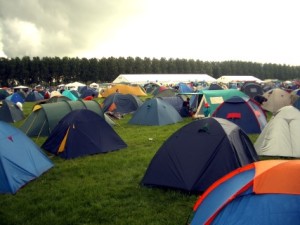In order to pick the perfect tent for your family, you should consider your family’s unique needs. Factors to consider are the ease of erecting the tent, the materials the manufacturer used, and more.
Tent Sizes
 Many tents on the market have partitions to divide the large tent into small rooms. Some rooms are too small for an adult but are very appropriate for small kids.
Many tents on the market have partitions to divide the large tent into small rooms. Some rooms are too small for an adult but are very appropriate for small kids.
Several styles of tents have dividers that you can hang in different areas to make custom-sized rooms. Often, families divide a three-room tent into two large rooms. Tents with fixed-wall rooms are not as adaptable.
Consider the size of your family members. Tall or big people will need larger tents. Extra tents for kids can be much smaller than the core tents that hold sleeping adults and camping supplies.
Ease of Use
As any camper can attest, some tents are nightmares to assemble! When choosing a tent or a certain style of tent, check with the reviews to learn if it is easy or hard to assemble.
Ask the salesperson about how hard the display tent was to assemble. If the display tent was difficult to erect, chances are it will be very difficult out at the campsite. If you are a single parent or camp solo, consider buying a tent that one person can erect.
Tent Material Choices
Although manufacturers use polyester or nylon for most tents, you should consider several factors when buying a tent. Cotton canvas is extremely heavy – especially when wet — but cotton outlasts man-made fabrics.
Lightweight material is appropriate for summer or three-season camping. The rainfly and floor should have a waterproof coating, no matter what type of fabric it is. Urethane coatings will protect your nylon tent from ultraviolet damage.
Heavier fabrics can protect you during winter or cold-weather camping. Make sure you get a breathable fabric so you do not have condensation from your warm, moist breath collecting on the cold tent material.
Poles, Zippers, and Mechanics
 Many people overlook the small details, such as what the manufacturer used for the poles and zippers. Typically, tents made with inexpensive materials do not survive a camping season. It is very expensive to buy a new tent each summer!
Many people overlook the small details, such as what the manufacturer used for the poles and zippers. Typically, tents made with inexpensive materials do not survive a camping season. It is very expensive to buy a new tent each summer!
Poles used to be wooden, but now are aluminum or fiberglass. Both materials are lighter than their earlier counterparts but each has advantages and disadvantages. You also can order carbon fiber, but this material is the most expensive choice.
Fiberglass poles are cheaper than aluminum ones but they tend to splinter under heavy loads or in high winds. Generally, the broken pole rips through the tent, ruining it.
Aluminum or aluminum alloy poles may cost more but they are stronger in adverse weather or when supporting wet, heavy tents.
Concluding Thoughts
Picking the perfect tent for your family can be a daunting task, but if you consider the aforementioned factors, you can pick the best option for you.

